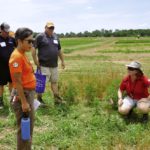The Essex Soil and Crop Improvement Association recently bestowed its 2018 Conservation Farm of the Year award to Maurice (Moe) Chauvin, a sixth-generation grain farmer from Pointe-aux-Roches (known as Stoney […] Read more
1.

The Chauvin farm takes a long-term view on measures like soil organic matter


Too early to assess corn and wheat yields, but the benefits to tomatoes already seem clear

The benefits may not show up immediately so farmers need to be patient

Cover crops can be important tools to improve soils, but there’s no single control solution